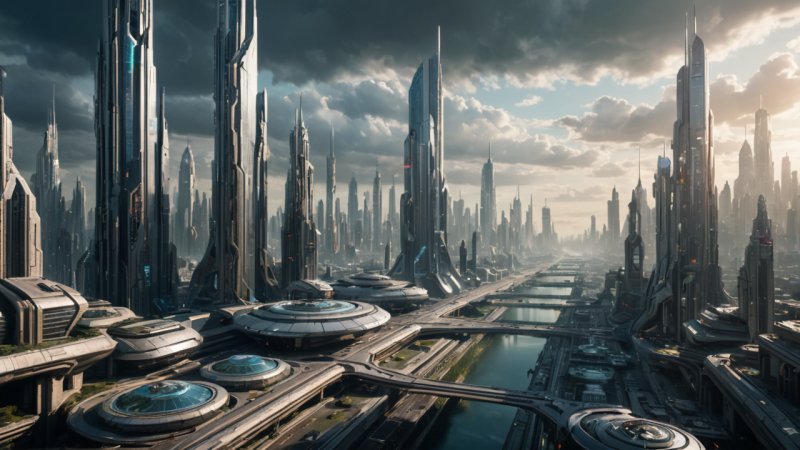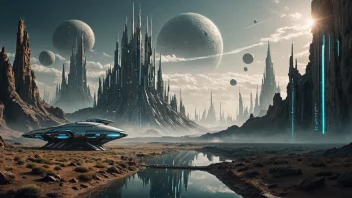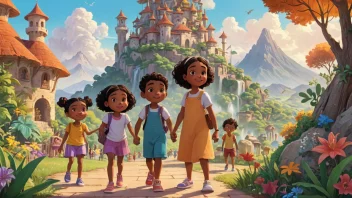Science fiction has long served as a mirror reflecting our hopes, fears, and aspirations about the future. Through the lens of speculative storytelling, authors have not only entertained readers but also provoked thought regarding the trajectory of humanity. This genre is unique in its ability to explore complex themes of technology, society, and culture, often presenting dystopian or utopian visions that resonate deeply with our current realities. In this article, we will delve into how science fiction portrays future societies and cultures, examining various themes, notable works, and the impact these narratives have on our understanding of what lies ahead.
The Utopian Ideal: A Vision of Perfect Societies
Utopian narratives in science fiction depict societies that have achieved a state of perfection or harmony. Works such as Aldous Huxley’s Brave New World and Isaac Asimov’s The Caves of Steel explore the complexities and consequences of a seemingly ideal world. In these stories, the pursuit of happiness and stability often comes at a cost, raising questions about individual freedom and the price of societal peace.
Key Themes in Utopian Science Fiction
- Collectivism vs. Individualism: Many utopian societies prioritize the collective good over individual desires, leading to a tension between personal freedom and societal stability.
- Technological Advancement: Advanced technologies are often depicted as tools for achieving utopia, yet they can also pose ethical dilemmas. The balance between innovation and moral responsibility is a recurring theme.
- Environmental Harmony: Some works envision societies that have successfully harmonized with nature, emphasizing sustainability and ecological balance as foundations of a perfect world.
Dystopian Realities: A Warning from the Future
In stark contrast to utopian visions, dystopian narratives often serve as cautionary tales that highlight the potential pitfalls of societal evolution. Classics such as George Orwell’s 1984 and Margaret Atwood’s The Handmaid’s Tale depict oppressive regimes and bleak futures that arise from unchecked power, surveillance, and societal complacency. These narratives resonate with modern readers, prompting reflection on current issues such as authoritarianism and the erosion of civil liberties.
Common Elements of Dystopian Fiction
- Surveillance and Control: Many dystopian societies are characterized by oppressive surveillance systems, where citizens are constantly monitored, leading to a loss of privacy and autonomy.
- Social Stratification: Dystopian worlds often present stark divisions between social classes, emphasizing inequality and the struggles of marginalized groups.
- Resistance and Rebellion: Central to many dystopian tales is the theme of resistance, where characters challenge the status quo in search of freedom and justice.
Cultural Reflections: Science Fiction as a Commentary on Society
Science fiction often serves as a commentary on contemporary cultural issues, using speculative futures to explore topics such as race, gender, and technology. Works like Octavia Butler’s Parable of the Sower and Nnedi Okorafor’s Binti address themes of identity, belonging, and the impact of technology on culture. These narratives allow readers to engage with difficult topics in a safe and imaginative context.
Science Fiction's Role in Social Discourse
- Exploring Identity: Many science fiction stories address questions of identity, particularly in terms of race, gender, and sexuality, encouraging readers to reflect on societal norms.
- Technological Ethics: As society grapples with rapid technological changes, science fiction provides a platform to discuss the ethical implications of advancements such as artificial intelligence and genetic engineering.
- Imagining Alternatives: By envisioning diverse futures, science fiction challenges readers to consider alternative societal structures and cultural norms, fostering empathy and understanding.
The Influence of Science Fiction on Real-World Culture
The impact of science fiction extends beyond literature and into popular culture, influencing everything from films and television to fashion and art. The genre has inspired technological innovation, with many concepts once confined to the pages of novels becoming a reality. The popularity of franchises like Star Trek and The Matrix demonstrates how science fiction has shaped cultural narratives, inspiring generations to dream about the future.
Science Fiction's Legacy in Popular Culture
- Inspiring Innovation: Many scientists and inventors cite science fiction as a source of inspiration for their work, leading to real-world advancements that mirror those found in speculative fiction.
- Cinematic Adaptations: The genre has seen countless adaptations in film and television, bringing stories to life and introducing new audiences to the themes and ideas originally explored in literature.
- Fashion and Design: Science fiction aesthetics have influenced fashion and design trends, with futuristic styles and concepts permeating popular culture.
Conclusion: The Future of Science Fiction
As we continue to navigate an ever-changing world, the role of science fiction in portraying future societies and cultures remains vital. This genre not only entertains but also provides a platform for critical reflection on our values, fears, and aspirations. Whether through utopian dreams or dystopian warnings, science fiction challenges us to envision the possibilities of tomorrow. As we turn the pages of these imaginative works, we are reminded of the power of storytelling to shape our understanding of the world and inspire us to strive for a better future.






